Saul The Tragic King Act III
Mike Ervin

Saul The Tragic King – Act III
As a reminder, the story of Saul occurs predominately in 1st Samuel, with the tragic death of Saul occurring in the last (31st) chapter.
In Act I we met the priest Eli, Hannah (Samuel’s mother), and Samuel. We also learned of the war with the Philistines, and eventually the victory of the Philistines over the Israelites and the capture of the Ark of the Covenant. And later we learned of the victory of the Israelites (led by Samuel) over the Philistines.
Then in Act II, as Samuel grew older, and the people would not accept Samuel’s sons as a replacement, they demanded a King. And God tells Samuel to anoint Saul as the first King. After a series of bad decisions and actions by Saul, Samuel announces to Saul that God has decided to reject Saul.
Saul The Tragic King – Act III
So new we enter into Act III of Saul the Tragic King. It begins in chapter 16. And as usual in the narrative style of the writer of Samuel it gets right down to brass tacks.
In the opening of Chapter 16 Saul’s loss of status is made clear by the selection of a new leader, who will eventually replace Saul. In Bethlehem, Samuel meets a shepherd named David whom he discerns to be the chosen king of Israel. Samuel anoints David to show that he will be the new leader, but the anointing is not made public.
The opening verses describe the selection process, directed by God.
Saul – The Tragic King – Act III
“And the LORD said to Samuel, “How long are you going to grieve about Saul when I have cast him aside from reigning over Israel? Fill your horn with oil and go. I am sending you to Jesse the Bethlehemite, for I have seen Me among his sons a king.”
And then a long selection process plays out, as Jesse brings out seven of his sons one by one for Samuel to meet. And as each one is presented Samuel say something along the lines of “this one the Lord has not chosen.” And finally Samuel asks, “Are there no more lads?’
And Jesse responds: “The youngest still is left, and he is tending the flock.” And Samuel said to Jesse, “Send and fetch him.” And we finally meet David.
Saul The Tragic King – Act III
And the story continues: “And he sent and brought him. And he was ruddy, with fine eyes and goodly to look on. And the LORD said, “Arise, anoint him, for this is the one.” And Samuel took the horn of oil and anointed him in the midst of his brothers. And the spirit of the LORD gripped David from that day onward.”
And the text turns immediately turn back to Saul (who does not know David has been anointed to replace him) and the text continues: “And the spirit of the LORD had turned away from Saul, and an evil spirit from the LORD had struck terror in him. And Saul’s servants said to him, “Look, pray, an evil spirit from God has stricken terror in you. Let our lord, pray, speak. Your servants are before you - we shall seek out a man skilled in playing the lyre, and so, when the evil spirit of God is upon you, he will play and it will be well with you.” And Saul said to his servants, “ See for me, pray, a man who plays well, and bring him to me.”
Saul The Tragic King – Act III
And it continues: “And one of the lads answered and said, “ Look, I have seen a son of Jesse the Bethlehemite, skilled in playing, a valiant fellow, a warrior, prudent in speech, a good-looking man, and the LORD is with him.” And David came to Saul and stood in his presence, and Saul loved him greatly, and he became his armor bearer.
And Saul sent to Jesse, saying, “ Let him stand, pray, in my presence, for he has found favor in my eyes.” And so, when the spirit of God was upon Saul, David would take up the lyre and play, and Saul would find relief, and it would be well with him, and the evil spirit would turn away from him.
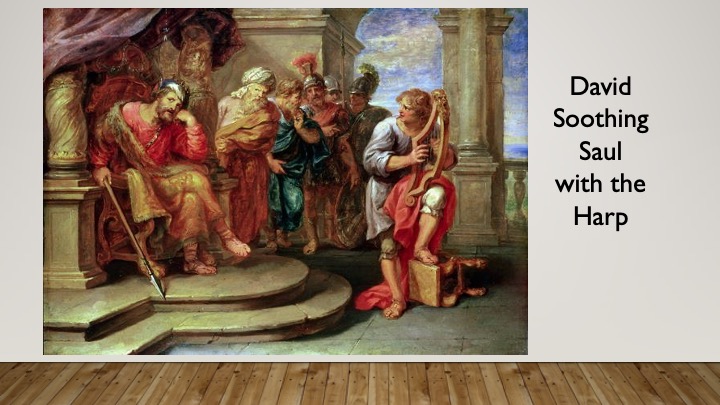
Saul The Tragic King – Act III
And in the very next passage at the beginning of Chapter 17 we see: “And the Philistines gathered their camps for battle, and they gathered at Socoh, which is in Judah, and they encamped between Socoh and Azekah, at Ephes-Dammim. And Saul and the men of Israel had gathered and encamped in the Valley of the Terebinth and they deployed to do battle against the Philistines. The Philistines took their stand on the hill on one side and Israel took its stand on the hill on the other side, with the ravine between them.” … And the champion sallied forth from the Philistine camps, Goliath was his name, from Gath, his height was six cubits and a span.
And the Philistine said, “ I am the one who has insulted the Israelite lines this day! Give me a man and let us do battle together!” And Saul heard, and all Israel with him, these words of the Philistine, and they were dismayed and very frightened.
Saul The Tragic King – Act III
And David was there, bringing food to his brothers who were there to fight. And David said to some of the men: “What will be done for the man who strikes down yonder Philistine and takes away insult from Israel? For who is this uncircumcised Philistine that he should insult the battle lines of the living God?”
And the words David had spoken were heard, and they told them to Saul, and he fetched him. And David said to Saul, “ Let no man’s heart fail him! Your servant will go and do battle with this Philistine.” And Saul said to David, “You cannot go against this Philistine to do battle with him, for you are a lad and he is a man of war from his youth.”
And David said to Saul, “ A shepherd has your servant been for his father with the flock. When the lion or the bear would come and carry off a sheep from the herd, I would go out after him and strike him down and rescue it from his clutches.“ … “and this uncircumcised Philistine will be like one of them, for he has insulted the battle lines of the living God.”
Saul The Tragic King – Act III
And Saul said to David, “Go, and may the LORD be with you.” And Saul clothed David in his own battle garb and put a bronze helmet on his head and clothed him in armor…he was unable to walk, for he was unused to it, and David said to Saul, “ I cannot walk in these, for I am unused to it.” And David removed them. And he took his stick in his hand and chose five smooth stones from the creek and put them in the shepherd’s pouch he had, in the satchel, and his slingshot was in his hand, and he came forward toward the Philistine.
And the Philistine said, “Come to me, that I may give your flesh to the fowl of the heavens and the beasts of the field!” And David said to the Philistine, “ You come to me with sword and spear and javelin, and I come to you with the name of the LORD of Armies, God of the battle lines of Israel that you have insulted. This day shall the LORD give you over into my hand and I will strike you down and take off your head, and I will give your corpse and the corpses of the Philistine camp this day to the fowl of the heavens and the beasts of the earth, and all the earth shall know that Israel has a God!”
Saul The Tragic King – Act III
“And it happened as the Philistine arose and was drawing near David that David hastened and ran out from the lines toward the Philistine. And he reached his hand into the pouch and took from there a stone and slung it and struck the Philistine in his forehead, and the stone sank into his forehead and he fell on his face to the ground.
And David bested the Philistine with sling and stone, and he struck down the Philistine and killed him, and no sword was in David’s hand. And David ran up and stood over the Philistine and took the sword from him and pulled it out of its sheath and finished him off and cut off his head with it. And the Philistines saw that their warrior was dead, and they fled.
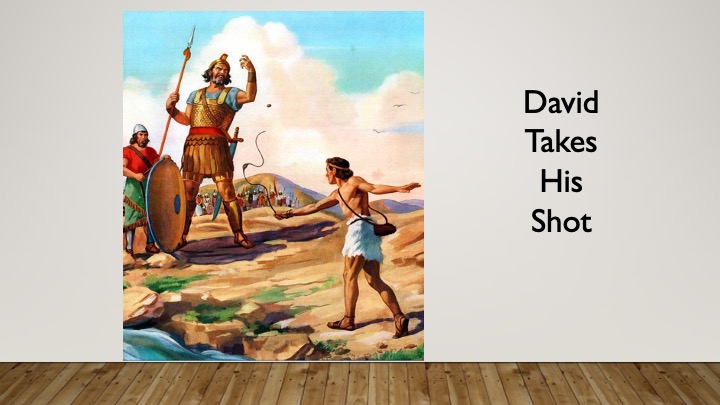
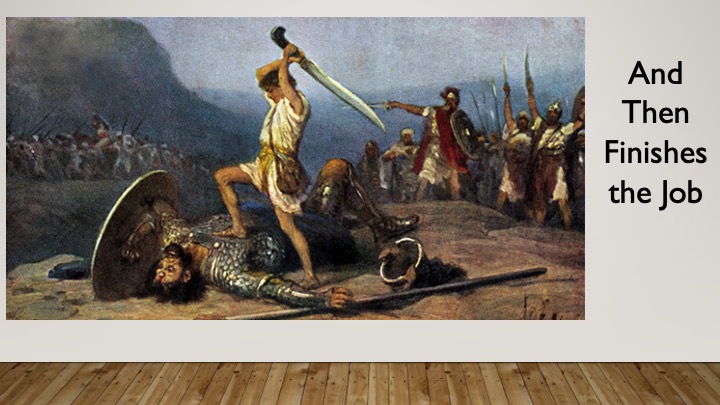
Saul The Tragic King – Act III
And I would like to point out a rather strange passage that begins immediately after David slays Goliath:
And when Saul saw David sallying forth toward the Philistine, he said to Abner the commander, “ Whose son is the lad, Abner?” And Abner said, “By your life, king, I do not know.” And the king said, “Ask you, pray, whose son is the youth?” And when David returned from striking down the Philistine, Abner took him and brought him before Saul, the Philistine’s head in his hand. And Saul said, “Whose son are you, lad?” And David said, “The son of your servant Jesse the Bethlehemite.”
And why is it strange? Because Saul already knew and loved David, as was reported earlier that Saul often called David to play the harp for him. And that Saul had written to Jesse requesting that David be allowed to stay with Saul to entertain him.
Saul The Tragic King – Act III
Is it really that strange to see two (and sometimes more) versions of episodes in religious stories?
The answer is that it is not strange at all. We saw it in this class years ago when we studied all of the stories in Genesis. And we know now from modern scholarship that it was not uncommon in the religious stories of surrounding cultures.
And note that 1st Samuel actually gives three accounts of Saul being chosen as king in three successive chapters. I only reported on the first two.
One possible explanation of this tendency is that the ancient writers were drawing their accounts from years of oral transmission from different sources, and they considered the best approach to present all of the versions for the readers to later study and learn more from the stories.
Saul The Tragic King – Act III
“And it happened as he finished speaking with Saul, that Jonathan’s very self became bound up with David’s, and Jonathan loved him as himself. And Saul took him on that day and did not let him go back to his father’s house. And Jonathan, and David with him, sealed a pact because he loved him like himself. And Jonathan took off the cloak that was on him and gave it to David, and his battle garb, and even his sword and his bow and his belt. And David would sally forth, wherever Saul sent him he would succeed. And Saul set him over the men of war, and it was good in the eyes of the troops and also in the eyes of Saul’s servants. And it happened when they came, when David returned from striking down the Philistine, that the women came out from all the towns of Israel in song and dance, to greet Saul the king with timbrels and jubilation and lutes.
And the celebrant women called out and said,
“Saul has struck down his thousands and David his tens of thousands!”
Saul The Tragic King – Act III
And Saul was very incensed, and this thing was evil in his eyes, and he said, “ To David they have given tens of thousands and to me they have given the thousands. The next thing he’ll have is the kingship.” And Saul kept a suspicious eye on David from that day hence.
And on the next day, an evil spirit of God seized Saul and he went into a frenzy within the house when David was playing as he was wont to, and the spear was in Saul’s hand. And Saul cast the spear, thinking, “ Let me strike through David into the wall.” And David eluded him twice. And Saul was afraid of David, for the LORD was with him, but from Saul He had turned away.
And Saul removed him from his presence and set him as captain of a thousand, and he led the troops into the fray. And David succeeded in all his ways, and the LORD was with him. And Saul saw that he was very successful, and he dreaded him. But all Israel and Judah loved David, for he led them into the fray.
Saul The Tragic King – Act III
19 And Saul spoke to Jonathan his son and to all his servants to put David to death, 2 but Jonathan the son of Saul was very fond of David, and Jonathan told David, saying, “Saul my father seeks to put you to death, and so now, be on the watch, pray, in the morning, and stay in a secret place and hide.
And Jonathan spoke well of David to Saul his father and said to him, “ Let not the king offend against his servant David, for he has not offended you, and his deeds have been very good toward you. 5 He took his life in his hands and struck down the Philistine, and the L ORD made a great victory for all Israel. You saw and rejoiced, and why should you offend with innocent blood to put David to death for no cause?” 6 And Saul heeded Jonathan’s voice, and Saul swore, “As the L ORD lives, he shall not be put to death.” 7 And Jonathan called to David, and Jonathan told him all these things. And Jonathan brought David to Saul, and he served him as in times gone by.
Saul The Tragic King – Act III
And there was still more fighting, and David sallied forth and did battle with the Philistines and struck a great blow against them, and they fled before him. And an evil spirit of the LORD came upon Saul as he was sitting in his house, his spear in his hand and David playing. And Saul sought to strike the spear through David into the wall, but he slipped away from Saul, and Saul struck the spear into the wall.
Then David fled and escaped on that night. And Saul sent messengers to David’s house to keep watch over him and to put him to death in the morning. And Michal his wife told David, saying, “ If you do not get yourself away tonight, tomorrow you’ll be dead.” And Michal let David down from the window, and he went off and fled and got away.
Saul The Tragic King – Act III
And so, David was on the run (from Saul), but David learned that the Philistines were attacking Keilah.
23
“Look, the Philistines are fighting against Keilah and they are looting the threshing floors.” And David inquired of the LORD , saying, “Shall I go and strike down these Philistines?” And the LORD said to David, “Go and strike down the Philistines and rescue Keilah.” And David’s men said to him, “Look, we’re afraid here in Judah, and how much more so if we go to Keilah against the Philistine lines!” And David again inquired of the LORD , and the LORD answered him and said, “Rise, go down to Keilah, for I am about to give the Philistines into your hand.” And David, and his men with him, went to Keilah and did battle with the Philistines, and he drove off their cattle and struck them a great blow, and David rescued the inhabitants of Keilah.
Saul The Tragic King – Act III
23
And it was told to Saul that David had come to Keilah, and Saul said, “God has given him in my hand, for he is closed inside a town with double gate and bolt.” And Saul summoned all the troops for battle to go down to Keilah to lay seige against David and his men. And David said, “LORD , God of Israel, Your servant has indeed heard that Saul seeks to come to Keilah to destroy the town on my count. Will the notables of Keilah hand me over to him? Will Saul come down, as Your servant has heard? LORD , God of Israel, tell, pray, Your servant.”
And the LORD said, “He will come down.” And David said, “Will the notables of Keilah hand me over, and my men, to Saul?” And the LORD said, “ They will hand you over.” And David arose, and his men with him, about six hundred men, and they came out from Keilah and moved about wherever they could, and to Saul it was told that David had gotten away from Keilah, and he ceased going out.
Saul The Tragic King – Act III
24
And it happened when Saul turned back from the Philistines that they told him, saying, “Look, David is in the wilderness of Ein-Gedi.” And Saul took three thousand picked men from all Israel and he went to seek David over the rocks of the wild goats. And he came to the sheepfolds along the way, and there was a cave there, and Saul went in to relieve himself, while David and his men were sitting in the far end of the cave.
And David’s men said to him, “ Here is the day that the LORD said to you, ‘Look, I am about to give your enemy into your hands, and you may do to him whatever seems good in your eyes.’” And David rose and stealthily cut off the skirt of the cloak that was Saul’s.” And David held back his men with words and did not let them rise against Saul, and Saul rose from the cave and went on the way. And David then rose and came out of the cave and called after Saul, saying, “My lord the king!” And Saul looked behind him, and David knelt, his face to the ground, and bowed down.
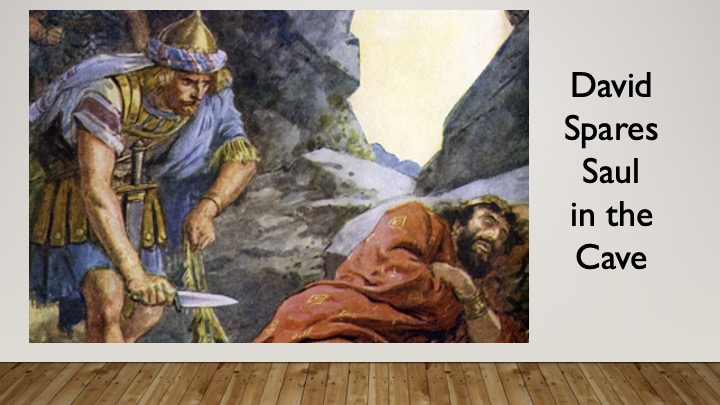
Saul The Tragic King – Act III
24
“And David said to Saul, “ Why should you listen to people’s words, saying, ‘Look, David seeks to harm you’? Look, this day your eyes have seen that the LORD has given you into my hand in the cave, and they meant to kill you, and I had pity for you and said, ‘I will not reach out my hand against my master, for he is the LORD ’s anointed.’ And, my father, see, yes, see the skirt of your cloak in my hand, for when I cut off the skirt of your cloak and did not kill you, mark and see that there was no evil or crime in my hand and I did not offend you, yet you stalk me to take my life.
And it happened when David had finished speaking these words to Saul, that Saul said, “ Is this your voice, my son, David?” And Saul raised his voice and wept. And he said to David, “ You are more in the right than I, for it is you who requited me good whereas I requited you evil. And you told today how you wrought good with me, when the L ORD delivered me into your hand, and you did not kill me. The LORD will repay you with good for what you have done for me this day.
Saul The Tragic King – Act III
And the Philistines gathered and came and camped at Shunem. And Saul gathered all Israel and they camped at Gilboa. 5 And Saul saw the Philistine camp, and he was afraid, and his heart trembled greatly. 6 And Saul inquired of the L ORD , and the L ORD did not answer him, neither by dreams nor by the Urim nor by prophets. 7 And Saul said to his servants, “Seek me out a ghostwife, that I may go to her and inquire through her.” And his servants said to him, “There is a ghostwife at Ein-Dor.” 8 And Saul disguised himself and put on different clothes, and he went—he together with two men—and they came to the woman by night, and he said, “Conjure me, pray, a ghost, and summon up the one I say to you.”
And the woman said, “Whom shall I summon up for you?” And he said, “Samuel summon up for me.” And she did. And Saul said to Samuel, “ I am in dire straits, and the Philistines are fighting against me and God has turned away from me and no longer answers me, and I called to you to let me know what I should do.”
Saul The Tragic King – Act III
And Samuel said, “And why do you ask me, when the L ORD has turned away from you and become your foe? 17 And the L ORD has done to you as He spoke through me, and the L ORD has torn the kingship from your hand and given it to your fellow man, to David.
And the LORD shall give Israel, too, together with you, into the hands of the Philistines. And tomorrow - you and your sons are with me. The camp of Israel, too, shall the LORD give into the hand of the Philistines.” And tomorrow - you and your sons are with me. The camp of Israel, too, shall the LORD give into the hand of the Philistines.” And Saul hastened and flung himself full length on the ground and was very frightened by Samuel’s words.
And Saul eventually arose and was fed by the ghost-wife and recovered enough to leave, knowing that he going to the battlefield to soon die.
Saul The Tragic King – Act III
And meanwhile the Philistines were battling against Israel, and the men of Israel fled before the Philistines, and they fell slain on Mount Gilboa. And the Philistines followed hard upon Saul and his sons, and the Philistines struck down Jonathan and Abinadab and Malkishua, the sons of Saul. And the battle went heavy against Saul, and the archers, the bowmen, found him, and he quaked with fear of the archers. And Saul said to his armor bearer, “Draw your sword and run me through with it, lest these uncircumcised come and run me through and abuse me.” But the armor bearer did not want to do it because he was very frightened, and Saul took the sword and fell upon it. And the armor bearer saw that Saul was dead, and he, too, fell upon his sword, and he died with him. And Saul died, and his three sons and his armor bearer, and all his men as well, together on that day. And the men of Israel who were on the other side of the valley and on the other side of the Jordan saw that the men of Israel had fled and that Saul and his sons were dead, and they abandoned the towns and fled, and the Philistines came and occupied them.
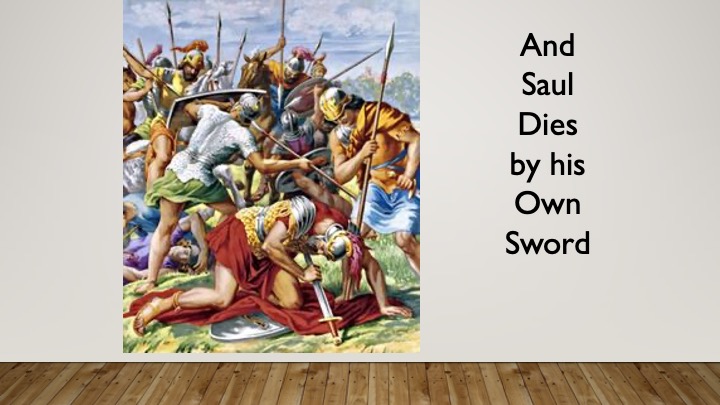
Saul The Tragic King – Act III
And it happened the next day that the Philistines came to strip the slain, and they found Saul and his three sons fallen on Mount Gilboa. And they cut off his head and stripped him of his armor, and they sent throughout the Philistine country to bring the tidings to the temples of their idols and to the people. And they put his armor in the temple of Ashtaroth, and his body they impaled on the wall of Beth-Shan.
And the inhabitants of Jabesh-Gilead heard what the Philistines had done to Saul. And every valiant fellow arose, and they went all night long, and they took Saul’s corpse, and the corpses of his sons from the wall of Beth-Shan, and they came back to Jabesh and burned them there. And they took their bones and buried them under the tamarisk in Jabesh, and they fasted seven days.
And so ends Saul and ends 1st Samuel and Act III.
Saul The Tragic King – Act III
And it is worthwhile to read the opening chapter of 2nd Samuel when David learns about the devastating loss of Saul and Jonathon and all of the Israelite fighting forces and David composes a beautiful elegy to the fallen of Israel. Maybe the most beautiful elegy written in ancient times:
“The splendor, O Israel, on your heights lies slain, how have the warriors fallen!
Tell it not in Gath, proclaim not in Ashkelon’s streets.
Lest the Philistine daughters rejoice, lest the daughters of the uncircumcised gloat.
O hills of Gilboa—no dew! and no rain upon you, O lofty fields.
For there the warriors’ shield was besmirched, the shield of Saul unburnished with oil.
From the blood of the slain, from the warriors’ fat - Jonathan’s bow did not retreat,
and the sword of Saul never turned away empty.
Saul and Jonathan, beloved and dear, in their life and their death they were not parted.
They were swifter than eagles, and stronger than lions.
O daughters of Israel, weep over Saul, who clothed you in scarlet and bangles,
who studded your garments with jewelry of gold.
How have the warriors fallen in the midst of the battle. Jonathan, upon your heights slain!
I grieve for you, my brother, Jonathan. Very dear you were to me.
More wondrous your love to me than the love of women.
How have the warriors fallen, and the gear of battle is lost.”